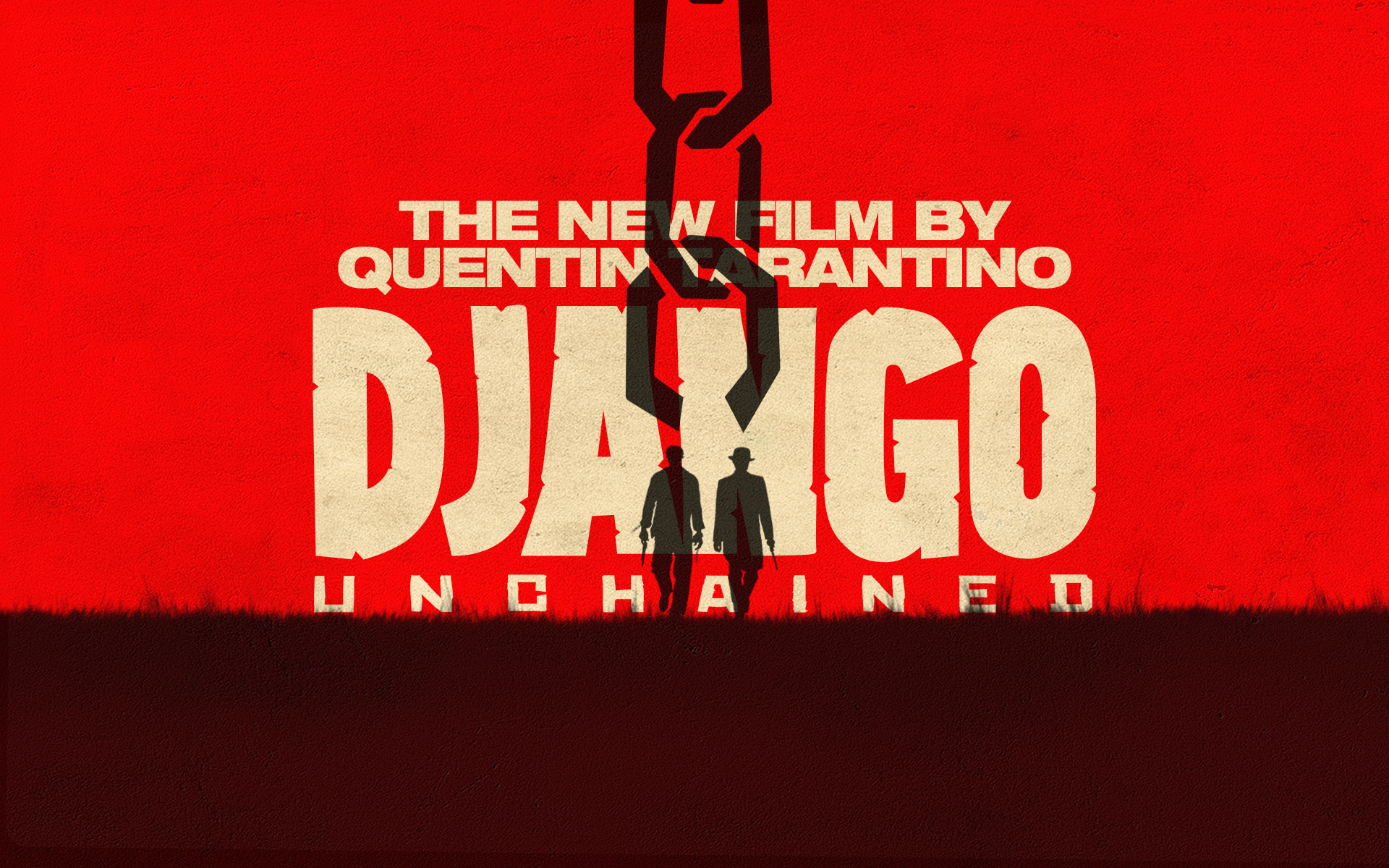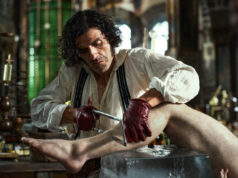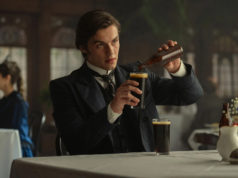Here we go with my leftover thoughts about Django Unchained that I couldn’t get in my review of the movie. Warning: spoilers ahead.
Everyone’s discussing the obvious reference: Sergio Corbucci’s 1966 Italian Western Django. Tarantino is a student of Corbucci and now says he’s working on a book of film criticism that will feature Corbucci. He uses Luis Enrique Bacalov’s theme song over the opening credits of his movie, and the star of Django, Franco Nero, turns up in Django Unchained as a losing wagerer in Candie’s “Mandingo fighting” racket, who asks Django for the spelling of his name. The fact that Nero’s last name is the Italian word for “black” is a fortuitous turn of events, as Schultz would phrase it.
However, no one’s discussing the reference to Sukiyaki Western Django, an utterly insane 2008 Japanese Western by Takashi Miike, who wrote the script for that film in English and then cast a bunch of non-English speaking Japanese actors, having them learn their lines phonetically. The only non-Japanese actor in the film was — you guessed it! — Quentin Tarantino, who both serves as a narrator and then portrays (in heavy old-age makeup) an old gunslinger who helps the hero and anachronistically calls himself an anime otaku. Miike’s film also uses Bacalov’s theme from Django, but it’s over the end credits, and it’s translated into Japanese. How awesome is that?
The best item I’ve seen about the film so far on the web is the fascinating interview that Henry Louis Gates conducted with Tarantino about the movie. Gates is a Harvard scholar who figured into Obama’s early presidency when he was racially profiled at his house. The filmmaker says he wanted Django Unchained to be a rebuke to D.W. Griffith’s Birth of a Nation, an idea that I’m totally on board with. Hmm, maybe this is why Spike Lee is criticizing Tarantino. When Lee was in film school at New York University, he made a short film about an African-American screenwriter trying to remake Birth of a Nation. Several faculty members had an allergic reaction and moved to kick Lee out of the program at NYU. Now Tarantino’s patch on Griffith’s seminal 1915 film is enjoying much greater exposure. Does Spike have a point in his criticism, or is he being a player hater? Discuss.
Also, Tarantino makes reference to the blaxploitation Western entitled The Legend of Nigger Charley. Aisha Harris at Slate explores the fascinating history of such films, marketed to African-American audiences during the 1970s.
Here’s a left-field theory: Is Django Unchained trafficking in His Girl Friday references? Howard Hawks’ 1940 comedy about a newspaper editor and his ex-wife/star reporter getting back together doesn’t seem to have much in common with Tarantino’s movie, but the heroine of the 1940 movie shares the name of Hildy with Django’s wife. Also, Schultz yells out “Sold, American!” when he agrees to purchase Django. The character of Hildy in His Girl Friday yells out the same thing during an argument with her ex-husband — she’s parodying an auctioneer’s fast-paced patter as a way of making fun of her ex’s fast-talking ways. Is this just a coincidence? I wonder.
Of course, this is a familiar trope in Tarantino’s movies: The most dangerous people are always the ones who talk best, not the ones who fight best or shoot best. Much like the character of Hans Landa from Inglourious Basterds, King Schultz talks as a way of lulling his targets into a trance while he prepares to strike. (Also, like Landa, he’s fluent in French as well as German and English.) Yet the real linguistic drama goes on with Django, who is barely literate as the story begins, but late in the film has learned to smooth-talk his way out of a jam with the mining company slavedrivers.
Another Tarantino trope gets aired here: characters portraying real-life situations as if they were actors. It reaches as far back as the acting lesson given to Tim Roth’s undercover cop in Reservoir Dogs and Jules telling Vincent to get into character in Pulp Fiction. Here we’ve got Django needing to portray an African-American slavedriver. “Ain’t nothin’ lower than a black slaver,” he tells Schultz. The German’s response is, “Then play him that way. Give me your black slaver.”
Schultz makes reference to D’Artagnan, the slave torn apart by Candie’s dogs. He points out that Alexandre Dumas, the French novelist who invented the character of D’Artagnan, is black. This is true! The author of The Three Musketeers and The Count of Monte Cristo was the grandson of a Haitian slave and wrote about his racial background in a novella called Georges. Anyway, the horrible fate of the slave D’Artagnan and Django’s acquiescence to it sets up Django’s awesome battle cry of “D’Artagnan, motherfuckers!” near the end.
In-joke casting: The Dukes of Hazzard star Tom Wopat as the marshal who surrounds Schultz and Django after the former kills the sheriff … Matt Houston star Lee Horsley as a friendly sheriff who invites Django and Schultz in for birthday cake … Russ Tamblyn reprising his role in Son of a Gunfighter, and his real-life daughter Amber Tamblyn as Daughter of Son of a Gunfighter … James Remar as Candie’s bodyguard, in a role that was supposed to be played by Kurt Russell … Tarantino himself as an Australian slavedriver, in a role that was supposed to be played by Anthony LaPaglia












BLAZING SADDLES meets MANDINGO
without even the rush of –POP– cultural incest
in DE-POP unfolding 2012.
Tarrentino, NEVER an original, remains just
another franchise slum, capstone ‘authorized
and approved’ —PUNK.
AVOID at all costs.
Lol, says you and no one else.
Great review, love all the insights. With all the trash out there in the past 20 years, this went to the top of the list, next to Deer Hunter, Apocolypse, Good Fellas, Departed, Heat, Three Days of Condor, Shining, Royal Tenenbaum.
The nay sayers and all their silliness know right where to go.
My neighbor loved it and he’s a 65 year old black man who loves westerns.
I’d like to know how it was recieved in other black demographics.
It told us a great American story, revealed awful truths about our history, (not covered by TV “Roots”), shone light on our flaws as human beings but also our incredible ability to alter our path and destination. Above all else, this movie reveals the justification for one of the bloodiest civil wars of all time and the necessity for the incredible loss of life. Alot of ignorant, backass, rascist people had to die. And even now, we are reminded there should have been a better effort to cleanse the entire country of rascist degenerates.
Sorry, for saying that but Django wasn’t so good as i expected. I was really dissapointed!
One thing I will say: Django has that “awesome battle cry of ‘ D’Artagnan’ “ at the end, but I was a little put off earlier when Schultz offered to pay to save D’Artagnan’s life and Django actually stopped him from doing so, which led to the dogs ripping the runaway slave apart. I’ll always be a little confused as to why Django did that (and then later on invokes his name as a battle cry in his honor). It seemed in part like he wanted to prove that he wasn’t intimidated by Candie because he’d seen much worse, but still seemed a little cold and out of character for Django to stop Schultz from saving the man.